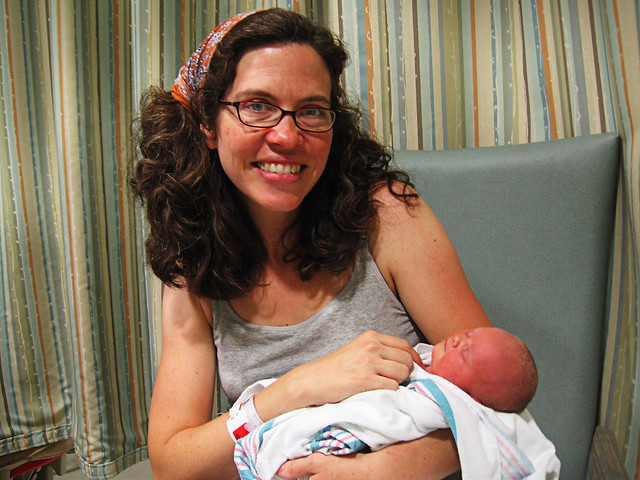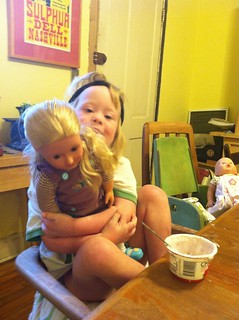I figured I might as well share on the blog about an event that happened last week: I had a seizure. I have seizures all the time--small ones referred to as "speech arrests," and occasional big ones as I'm falling asleep. What made last week's noteworthy was that it was big, meaning that I temporarily lost most gross motor and speech capabilities, and it happened during the day, in one of the gyms on the CofC campus. The outstanding student running the fitness center was an EMT, so he knew immediately what was happening and helped me to sit down (I don't remember any of this--he told me the next day). He also called the ambulance, which means that all the bigwigs on campus learned that Alison Piepmeier was taken to the hospital.
So let's talk about seizures. They are a completely normal side-effect of brain surgery. They are the thing that clued us in to the fact that I have a brain tumor, so I've been on anti-seizure medication since December 2010. As my neuro-oncologist at Duke regularly reminds me, the purpose of the medication isn't to eradicate all seizures; it's to give me a good quality of life. I've been having small seizures--mostly speech arrests--since December 2010. Nothing is wrong--this is to be expected. I'm just fine.
One thing seizures do is to destabilize the normal. Things that are generally so familiar as to be completely non-noticeable suddenly appear, and are weird, distinct. A smell reminds me of a million things I've smelled like that before, and shifts me to some unexpected emotional terrain. I hear a sound and it evokes some sort of dream--did I have it last night? Years ago?--and for an instant I'm catching glimpses of the dream world, a sort of dark blue around the edges. Any sensory input can have this effect, from a raindrop hitting my arm to the taste of lukewarm coffee.

Then it becomes an issue of framing: is this a kind of miraculous moment, where I'm experiencing the world with fresh perception, or is it a frightening destabilization? I guess both. Much of the familiarity of the everyday world is comforting. It provides a predictability that's functional. Not knowing when that familiarity is going to disappear is--well, it's just odd. It's like I'm walking along and I have no real sense whether there will be a stable surface under my foot. Sort of an Alice in Wonderland phenomenon. And we all know that Alice became a celebrity because of the wildness she was exposed to. But she didn't always seem to be having fun in the process.
I'm paying more and more attention to the seizures because I'm curious about how they work. (Let me assure you that doctors, too, are curious. It seems like they know very little about seizures. I'm on a medication that works quite well for lots of people, but they don't know why. It was apparently an accidental discovery.) In particular, I want to understand the speech arrests: For thirty seconds or so, I'll lose the ability to understand language or to speak it. When it's coming on, it often feels a tiny bit like deja vu, and there's a kinesthetic component I can't quite describe. Then if there's a person with me, that person starts reciting a script that people always recite when I'm having a speech arrest. I can't remember it completely, but it's something about being at the bottom of the ocean, and they're saying something encouraging. Maybe I'm supposed to follow a certain sea creature?
The point of course is that the person
isn't reciting this script. Whatever they're saying to me, my brain starts interpreting it as this script, which--like dream-language--I can't fully remember afterward. The other morning Maybelle started reciting the script, and the non-seizing parts of my brain were well aware that she wasn't actually saying those things.
During a speech arrest I do a fairly good job of nodding, looking interested, and pretending that I'm not having a seizure. Faking it. Many, many people have been around me when I've been having speech arrests, and they haven't known. The closest people in the world to me--family, best friends--have sat through them without knowing it. In fact, only one person has identified speech arrests three separate times, and that was Catherine. Biffle is hyper-alert, so sometimes if I'm just pausing to think through what I want to say, he asks, "Are you having one?"
I've never had one in class, or when I've been giving a public talk of any sort. So if you're a student reading this, please don't follow Biffle's lead and assume that any thoughtful pause is a speech arrest. It usually isn't.
Bottom line: I'm healthy. Nothing terrible is happening. I don't particularly like the public nature of a big seizure at the gym, but it wasn't dangerous--just vaguely embarrassing. It did show me what a sweet campus this is, though: I've gotten warm, encouraging emails from lots of friends and colleagues, and the gym guy was delighted when I came in the next day to assure him I'm alright.
*Follow-up note: I went to the gym today, eight days after the seizure, and did some biking, seizure-free. Biffle suggested biking for the seemingly logical reason that my head won't be bouncing, sloshing my brain around enough to trigger a seizure. As Trey said, "It makes as much sense as anything else."


















